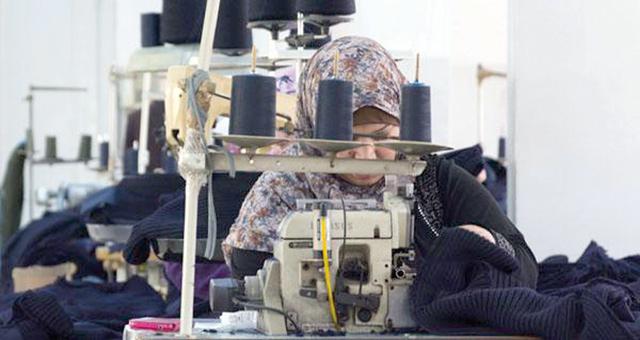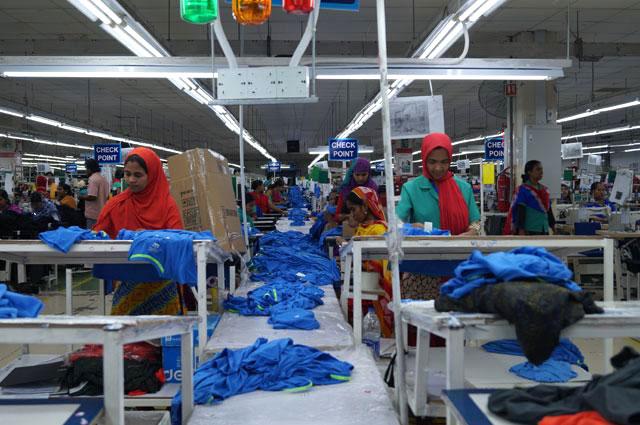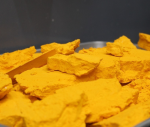You are here
JCI report outlines garment sector woes, demands
By Bahaa Al Deen Al Nawas - Dec 08,2020 - Last updated at Dec 08,2020

The number of employees in Jordan’s garment sector reached over 76,000 workers in 2019, according to a Jordan Chamber of Industry report (Petra photo)
AMMAN — The coronavirus crisis has impacted consumer demand, especially for non-essential goods, including garments and textiles, at the time when the International Monetary Fund (IMF) expects a drop in global trade of about 32 per cent, according to a Jordan Chamber of Industry (JCI) report sent exclusively to The Jordan Times.
Large global garments’ companies have laid off many of their employees due to the fall in their sales resulting from the coronavirus crisis, according to the report, shared by the representative of the leather and textile industry at the JCI, Ehab Qadri.
The situation is not much different in Jordan with regard to the garments and textiles industry where a decrease in both local and global demand has affected small and large enterprises focusing on the local global markets, respectively.
Small- and medium-sized enterprises (SMEs) have become unable to fulfil their commitments, including payment of salaries and other expenses such as energy, raw materials, rent and interest on loans, all of which have limited their competitiveness, especially with imports.
So far, the pandemic has lasted throughout many sale seasons such as religious holidays and the return to school and university season, which amplified the repercussions of the crisis on the sector.
The government’s measures to combat the spread of the virus, including curfew, and lockdowns in addition to the “unclear decisions” made by the government have caused recessions in the market as with the sale of school uniforms, which has dropped by more than 85 per cent during the week preceding the start of the academic year compared with the same period in previous years, according to the report.
As for exporting businesses, they were impacted by the lack of demand in the US market, as many orders were cancelled by importers, including those that were ready for shipment and/or were being manufactured.
The rate of orders on ready-made clothes has dropped by more than 50 per cent of the usual volume, as exports are forecast to drop by 25 per cent by the end of the year, compared with last year’s exports, the report said.
To combat the repercussions of the pandemic on the sector, the report recommended taking immediate measures to support large corporations in sustaining their production and workforce at the levels they were at prior to the crisis, in addition to providing cash and limiting production costs for SMEs to enable them to retain their Jordanian employees, the report said.
‘Clear demands’
The JCI has recently provided the government with a comprehensive plan dedicated to the garment and textile sector, in which “clear demands” were declared in order for the production of the sector to recover.
The first set of demands focused on the government’s purchases and tenders, requesting a raise in the preferential price for Jordanian industries in government tenders by up to 30 per cent.
The JCI also asked for allotting no less than 20 per cent of government tenders for the products of SMEs, in addition to committing official and civil organisations to implement the decision to restrict purchases to local industries.
It also called for not specifying any requirements or specifications that do not conform to the adopted Jordanian standards when government tenders are issued.
The second set of demands focused on protecting local production and limiting imports, mainly urging stricter supervision on imports and implementing “the principle of reciprocity” with countries that hinder the entrance of Jordanian products to their markets.
They also called for stricter supervision to eliminate tax evasion and cancel postponing payments of taxes levied on imported goods that have a local equivalent in the market.
The third set of demands focused on providing sufficient cash to allow the sector to maintain its employees, calling for supporting the salaries of Jordanian workers in production branches by assuming the responsibility for a portion of the salaries, especially those of the last quarter of 2020.
The demands included having the Central Bank of Jordan design a specialised funding programme to provide liquidity and enable the sector’s facilities meet their financial duties, which would reflect on their exporting capabilities, similar to the earlier programmes the bank has issued to support SMEs.
The third set also called for covering Development Zones with a system of tax incentives for the industrial sector, as these areas contribute to the economy and society in regard to exporting and employment, especially in underprivileged areas. They also called for exempting the sector from any increase to the minimum wage for at least three years.
The plan called for reducing production costs through the removal of the 1 per cent customs’ services allowance imposed on production inputs, as the report said that raw materials constitute “the main cost factor in the sector”.
‘Quantum leap’
Taking such measures would reflect positively on the competitiveness of products and contributions of the sector to employment and economic growth, and thus have a positive impact on the Treasury, Qadiri told The Jordan Times over the phone on Tuesday.
“The garments and textile sector has around 3,180 facilities, according to the latest survey conducted in 2018, although there were only 600 facilities by the end of the last century,” Qadiri said.
He noted that this growth is due to the new investments that flowed into the Kingdom, especially after the Qualifying Industrial Zone (QIZ) agreement, the volume of which has reached over a billion dollars in the form of foreign investments that contributed to the growth and development of the sector.
In light of this “quantum leap”, the sector was able to boost its productive and operational capacities, also improving its machinery, and reaching global markets, he said, noting that this has allowed the industry to create thousands of jobs, and also “make a name” in international markets, especially in the US.
In regard to employment capabilities, the number of employees in the sector reached over 76,000 workers in 2019, which is 66 per cent higher than the percentage of workers in 2010, according to the report, which added that a third of the workers, around 25,000, are Jordanians, while there were only 8,000 Jordanian workers in 2010.
The report pointed out that the sector’s growth allowed it to open 22 production plants in the last decade, focusing on remote underprivileged areas, and providing 7,000 jobs to Jordanians, especially to women in those areas, at an investment volume of over JD200 million, thus reducing poverty and unemployment rate.
As for exports of garments and textiles in the last decade, they recorded an 8 per cent growth each year, and up to 10 per cent in 2019; going from JD700 million in 2010 to around JD1.6 billion in 2019, according to the report.
The sector at present constitutes 27 per cent of the total national exports, the report said, adding that there is untapped export opportunities that amount to around $550 million worth of exports to various areas around the world, which if utilised, could generate more than 33,000 employment opportunities; 65 per cent of which directly in the sector (21,000 jobs), while the remaining 12,000 will be indirect through the movement created in other sectors as well.
The report mentioned that the volume of added value created by the sector’s production processes reached over JD600 million, contributing 2 per cent of the gross domestic product.
Related Articles
AMMAN — The domestic value added (DVA) of Jordan’s garment, textile and leather (GTL) industry as a share of production output is relatively
Local products can reach Nigeria, Ethiopia, Kenya, Tanzania, Djibouti, Uganda and South Africa for having “excellent” markets, especially due to the availability of regular maritime routes and high level of security, Jordan Chamber of Industry (JCI) President Ayman Hatahet said Sunday.
AMMAN — The garment sector in Jordan “has accomplished remarkable achievements and high compliance rates in line with international standard

















